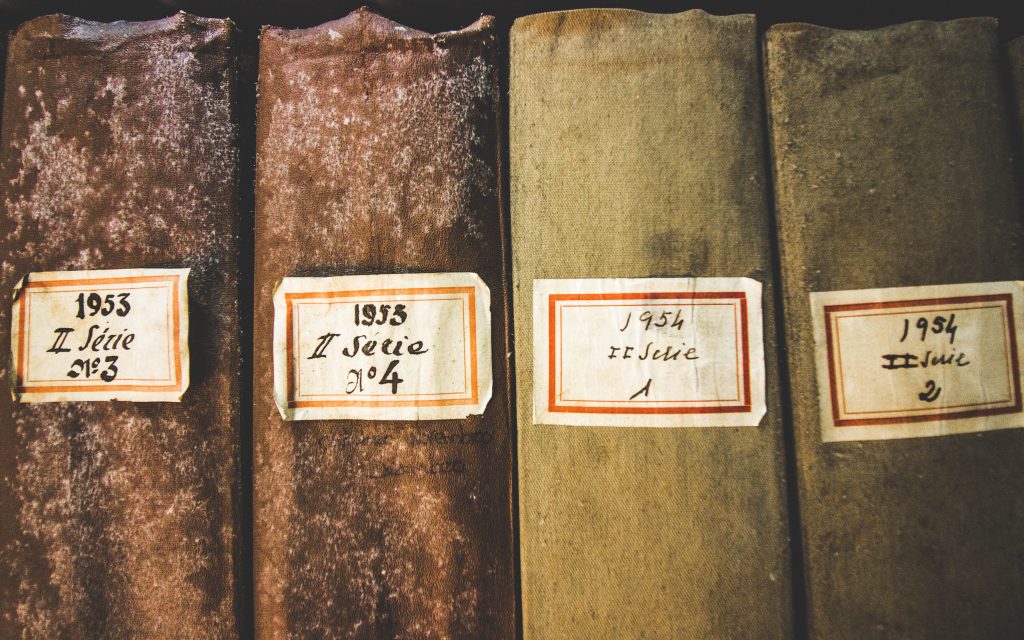Post by Christina Mantey
This post is the last in a series of five blog posts written by Christina Mantey, a research assistant on the Conceptualizing Recordkeeping as Grief Work (CRAGW) project. Christina has an interesting perspective on the emotional (and sometimes trauma-related) dimensions of archival work, having come to the field from a career in nursing. This series of blog posts is a personal account of her work as a research assistant with the CRAGW project and of her journey as a second-career archival graduate student.
Part 1: “Archiving Hurts”: How to Succeed and Fail in School
Part 2: “Archiving Hurts”: Hospital Adventures
Part 3: “Archiving Hurts”: Past Traumas, Future Traumas
Part 4: “Archiving Hurts”: The Fruits of Our Labour
Part 5: Ghosts and Stones
I continued reading. I read about archivists filtering through accident reports and medical photographs. I read about funding issues and understaffing and the difficulties of being an introvert at the reference desk. I read about community organizations dying out, their remaining members offering the body of records as a final act of service. I read about determination and pride and sadness and frustration.
The more I read the more I felt the pull of empathy, but the gnawing frustration I had experienced earlier still lingered without a satisfying resolution. I still couldn’t understand what was so terrible about this job that it could compare to the terrors I’d witnessed daily in the hospital. The situations described by the archivists seemed difficult and often heartbreaking but rarely nightmarish. Inevitably, there must be difficult elements in all careers. What was so disturbing about archiving that I would have an entire class session devoted to preparing me for its hardships in archival school, but not one in undergrad to warn of the guaranteed blood and guts of nursing?
As I sifted through the interviews — sorting themes and identifying like sentiments — I also unknowingly searched for evidence. I needed to understand why the archivists talked so painfully and emotionally about their jobs. For hours I bent over the screen, fingers grazing the trackpad with reflexive movements, considering words and phrases. I highlighted, deselected, highlighted again. Between my bent shoulders, the frustration still weighed on me. It was heavy and uncomfortable, a rock digging sharply into my chest.
The first time the rock shrank was when one of the participating archivists validated my feelings. The second was when another invalidated them.
The first time these words struck a nerve was when an archivist spoke of how they realized they could be affected by archival material for the first time. They seemed to be struggling with feelings of dissonance from the vicarious pain they had encountered from working with difficult records and were also feeling like they shouldn’t be “allowed” to feel it. The archivist’s mother was a nurse, and the archivist commented on the difference between archival and healthcare careers and how other professions dealt with much more visible and tactile difficulties. The archivist described this internal conflict:
“It was… literally the first time I had ever thought that there could be… a reaction from looking at records. And that we were able to have that reaction, and that was a legitimate thing to feel. And I remember talking to my mum, as a nurse, about it, and like, ‘How do you deal with this secondary trauma?’
“It just felt a bit ridiculous, as an archivist, to be reading this stuff, comparing yourself to someone who’s, you know, a trauma specialist or something. But I think it is… it is a real thing. Maybe just, it needs to be examined from the perspective of the outside observer. You know… we’re not pumping someone’s chest because they’re having a heart attack. But we might be reading about someone doing that, and then processing that record and then helping someone else, who may have been a family member of that person, access that record.”
This contributor acknowledges that archivists do not perform the gory emergency procedures of other professions but asserts that archivists do not escape their work without witnessing difficult experiences. These challenging events might be relegated to the past and a paper format, but no doubt they continue to inflict pain. Encountering the records I created during my nursing years — those detailing abuse or describing infected wounds — would not be an innocuous experience. Reading these medical records would not be as painful as my lived experience caring for the said person or wound, but the experience could still leave a mark.
This was the first time I felt my feelings were in a way validated by a professional in this field. I think I subconsciously felt like in some small way we were on opposing sides, archivists and I. Because I had had a negative gut reaction to a valid discussion in archival school, I was no longer qualified to be a part of the archival world. I could not feel reconciled with other archivists because our backgrounds were too different and we could not understand each other. This one small passage changed that. This archivist unknowingly crossed the line and spoke in my defense without my asking or prompting. Just this brief acknowledgment that other professions have traumatic parts of their job seemed to narrow the gap between us, to curve the two opposing lines into a single, welcoming circle.
The second passage that again blurred the line between nurse and archivist came from a participant as they described how the actions required of archiving difficult records have negatively affected their mental health. They described this difficulty:
“… we just relive and relive the same traumas over and over, with different elements, and involving different people in different contexts… I consistently relived trauma and grieving, and had to find a way through my grief while respecting the grief of everyone around me.”
After reading this confession, I stopped my scrolling, highlighting, selecting, deselecting, analyzing, and comparing for a while and just reread these lines. For me, these lines were a key to empathy and a key to understanding the difference between archiving and nursing. The difference wasn’t trauma. It wasn’t upset families or unreasonable managers. The difference was the ability to leave.
I realized trauma infects people in different ways. Some experience a sudden attack whose acute sting lifts with time. For others, trauma is an unseen poison that seeps into a being gradually, gently sickening the core. I experienced trauma from verbal abuse, watching death take the unwilling, and by the continuous pressure of the unrealistic expectations from myself and management, but even the worst days ended. Every day I was guaranteed the same ritual: happily shredding my scribbled notes of medication administration times and reminders of dressing changes. I would pack up my stethoscope and other medical accessories and get off the floor as fast as my Danskos could carry me. As I drove home, I would begin assiduously forgetting everything from the day that would go willingly. Even after my intentional forgetting, many of these images, sounds, and feelings would stay with me for that day, that night, that week, those years, and probably forever. However, the most poignant are muted with time, and the rest are so deeply buried they have been forgotten.
Archivists aren’t so lucky. Even if I hadn’t quit my nursing job, I don’t ever have to revisit my traumas (patient confidentiality encourages me to never think of them again) but many archivists live amongst their trauma daily. It is an archivist’s job to dwell on the material in their keeping, and their archival mandate couldn’t care less if it affects their mental health. How awful to know terrible secrets linger passively immortal in their respective Hollinger boxes and to be appointed to guard them with the same ferocity as cheerful 1970s Christmas letters and minutes from the local women’s organization.

As I begin to conclude my part of this project, I admit my angsty rock of hurt is still there. I can’t help it. However, I’ve realized its presence has nothing to do with the archival institution, or archivists, or even class discussions about difficult records. I think I’m just upset by how my wide-eyed-lady-bug-making-young-nursing-new-grad self was thrust into bad situations with little preparation and minimal support. She didn’t deserve the verbal and physical volleys thrown at her. No one does. Not a new nursing grad, not a new archives grad.
I’ve also come to realize that it doesn’t do any good to ruminate. I’ve experienced my frustrations and hurts and so have others. It does do good to take what I’ve learned and use it to enact change or at least root for it. From my personal experiences, and from what I’ve taken away from the retellings of archivists, I’ve learned that it is good for people working in social settings where emotions can be deep and upsetting to have some training in interpersonal interactions and some accessible mental health support. I’ve learned that as a profession, we should feel free to talk about the hurts we have archived without fear of retribution or being label a “bad archivist” for possessing emotion and original thought. We should talk about the hurts so they may be acknowledged and addressed. We should talk about the hurts so they may lessen their poignancy and not develop into angry barbs or heavy stones clutched to the chest. I hope this research will shed light on the emotional needs of archivists and bring these lessons a little closer to reality.
I’m done for the day. As I quit my data analysis software and close my laptop, I stretch and feel a little lighter. I smile and realize that the heavy stone I was hauling around is smaller now that I’ve examined it more closely. Now it’s just a pebble stashed in one of the pockets of my jeans, but I’ve forgotten which one.
